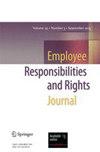为谁提供住宿?COVID-19大流行是否改变了残疾人灵活和远程工作的格局?
IF 1.7
Q3 INDUSTRIAL RELATIONS & LABOR
引用次数: 0
摘要
在2019冠状病毒病大流行之初,灵活和远程工作被视为提高残疾人就业率的灵丹妙药。这种观点没有认识到,并非所有的残疾工人都能获得可以远程或灵活安排工作的工作。使用2019年和2021年当前人口调查和美国社区调查的数据来检查残疾工人的性别、种族、民族、年龄和教育程度是否增加(或减少)了他们获得灵活和远程工作的机会,以及自2019冠状病毒病大流行以来获得这些选择的残疾工人群体是否扩大了。调查结果表明,与非残疾工人相比,在大流行之前,残疾工人报告的灵活工作和远程工作比例相似。然而,在大流行开始后,残疾工人远程工作的比例较低。无论哪一年,灵活和远程工作的比例因人口群体而异,白人、女性和受过大学教育的残疾工人比被边缘化的残疾工人更有可能获得这些选择。本文章由计算机程序翻译,如有差异,请以英文原文为准。
An Accommodation for Whom? Has the COVID-19 Pandemic Changed the Landscape of Flexible and Remote Work for Workers with Disabilities?
Abstract At the start of the COVID-19 pandemic, flexible and remote work was viewed as a silver bullet that would increase employment rates among people with disabilities. This view fails to recognize that not all workers with disabilities can obtain jobs that can be done remotely or on a flexible schedule. Data from the 2019 and 2021 years of the Current Population Survey and the American Community Survey were used to examine if disabled workers’ gender, race, ethnicity, age, and education, increase (or decrease) their chances of accessing flexible and remote work and if the group of workers with disabilities who access such options expanded since the COVID-19 pandemic. Findings indicate that compared to their non-disabled counterparts, prior to the pandemic, workers with disabilities reported similar rates of flexible and remote work. Workers with disabilities, however, had lower rates of remote work after the start of the pandemic. Regardless of year, flexible and remote work rates vary by demographic group, with disabled workers who are white, female, and college-educated more likely to access these options than multiply marginalized disabled workers.
求助全文
通过发布文献求助,成功后即可免费获取论文全文。
去求助
来源期刊

Employee Responsibilities and Rights Journal
INDUSTRIAL RELATIONS & LABOR-
CiteScore
2.20
自引率
9.10%
发文量
30
期刊介绍:
Employee Responsibilities and Rights Journal fosters development of the field of employee relations by presenting high-quality, peer-reviewed original research articles and by linking practitioner concerns involving the employment relationship with academic rigor. The journal is interdisciplinary in focus, drawing from a broad range of disciplines including ethics, organizational behavior, law, economics, sociology, social psychology, industrial and employment relations, administrative and organizational studies, and philosophy to further the understanding of both employee responsibilities and rights. The journal offers an international forum for the publication of scholarly peer-reviewed original research including qualitative and quantitative empirical studies, case studies, critical commentaries, and conceptual and dialectic presentations. In addition, Employee Responsibilities and Rights Journal publishes a Perspectives Section that showcases important contributions in formats other than the traditional research article. Such contributions include symposia/roundtable discussions, commentaries, review essays, interviews, and book reviews.
 求助内容:
求助内容: 应助结果提醒方式:
应助结果提醒方式:


